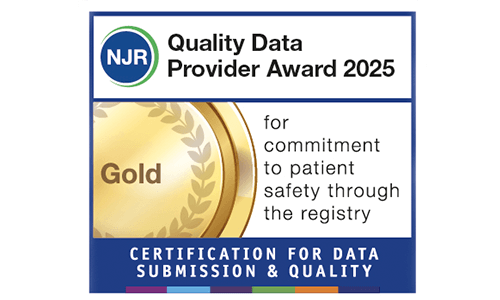Gallbladder pain usually strikes in the upper right of your abdomen, often after eating a fatty meal. The most common cause is gallstones - small deposits that block bile flow and trigger sharp pain, bloating, or nausea. Other causes include inflammation or bile duct issues.
Treatment depends on the cause. Mild cases may be managed with diet or medication, but many gallbladder problems are treated by removing the gallbladder. Most people recover well and live normally without it.
What is gallbladder pain?
Gallbladder pain refers to discomfort felt in your upper right abdomen, often caused by gallstones or inflammation. The pain may be sharp, sudden, or cramping, and can spread to your back or shoulder. It’s commonly triggered after eating fatty foods and may be accompanied by nausea or tenderness.
If you’re experiencing persistent upper abdominal pain, visit our abdominal pain page to learn more and explore treatment options.
What is the gallbladder?
Your gallbladder is a small, pear-shaped organ located in the upper right part of your abdomen, just beneath your liver. Its main job is to store and release bile - a digestive fluid made by your liver that helps break down fats and absorb fat-soluble vitamins.
When you eat, your gallbladder contracts and sends bile, through a network of tubes, called the biliary tract, to your small intestine. If these ducts become blocked, often by gallstones, you may feel pain or discomfort in your abdomen.
What is a gallbladder attack?
A gallbladder attack happens when a gallstone blocks the flow of bile, causing it to build up and trigger inflammation. This leads to sudden pain in your upper right abdomen, just below your ribs - answering the common question, “Where is the pain with a gallbladder attack?” The pain may also radiate to your back or right shoulder.
Attacks often follow fatty or heavy meals, especially in the evening. If symptoms are severe or persistent, you should seek medical care.
Symptoms of gallbladder pain
You may be wondering - what does gallbladder pain feel like? Gallbladder pain is different to other stomach pain.
Gallbladder pain may feel:
- Sudden and sharp, lasting minutes to hours
- Dull or cramping, often worse after eating
- Focused below the breastbone or in your upper right side
- So intense and severe that it’s hard to sit still
- Deep and stabbing and doesn’t ease with movement, passing gas, or using the toilet.
Other common gall bladder pain symptoms include:
- Nausea or vomiting
- Fever or chills
- Yellowing of your skin or eyes (jaundice)
- Tenderness in your upper abdomen
- Dark urine or pale, clay-coloured stools
- Feeling bloated or itchy.
Where is gallbladder pain felt?
Gallbladder pain is most often felt in your upper right abdomen, just below your ribs.
It may also spread to your mid-abdomen, chest, or cause referred pain where discomfort radiates to your back or right shoulder blade. Gallbladder pain location in females may be felt in areas like the shoulder, back, or chest as women may be more prone than men to experiencing referred pain.
How long does gallbladder pain last?
Gallbladder pain typically lasts from a few minutes to a few hours. Most episodes resolve within 1 to 5 hours, but some may be shorter or longer depending on the cause.
If your pain is severe, persistent or accompanied by symptoms such as fever or jaundice, it may signal a more serious condition like cholecystitis (gallbladder inflammation) or bile duct blockage. Seek medical attention if your pain lasts longer than 8 hours, it is so intense that you can't find a position to relieve it, or if you develop a fever or jaundice.
Causes of gallbladder pain
There are several causes of gallbladder pain. Here are the most common causes:
Gallstones
Gallstones are the leading cause of gallbladder pain. These are hard, stone-like particles that form in your gallbladder when substances in bile, such as cholesterol or bilirubin, harden over time.
Gallstones can be as small as a grain of sand or as large as a golf ball. You may have one large stone, many small ones, or a mix of sizes. Gallstones are more common in women, people over 40, and those with a family history or certain health conditions like diabetes or liver disease.
Most people with gallstones don’t have symptoms, but when a stone blocks the bile ducts, it can trigger a painful episode called a gallbladder attack (biliary colic).
Bile duct stones
Bile duct stones (choledocholithiasis) are gallstones that move from your gallbladder into your common bile duct. When they block this duct, bile backs up - causing pain, infection, and sometimes serious conditions like pancreatitis or jaundice. These stones are less common but more dangerous than gallbladder stones. Symptoms include upper abdominal pain, fever, and yellowing of your skin or eyes.
Inflammation
Gallbladder inflammation (cholecystitis) happens when a gallstone blocks your cystic duct, trapping bile inside your gallbladder. This buildup increases pressure and can lead to infection which can result in sharp, persistent pain in your upper right abdomen, often spreading to your shoulder. Other symptoms may include fever, nausea, and jaundice.
Gallbladder disease
Gallbladder disease includes conditions like gallstones, inflammation (cholecystitis), poor bile flow (biliary dyskinesia), and bile duct infections (cholangitis). Causes range from blockages to autoimmune disorders.
Symptoms may include:
- Upper right abdominal pain
- Nausea or vomiting
- Fever or chills
- Jaundice (yellow skin or eyes).
Gallbladder polyps
Gallbladder polyps are abnormal growths in the lining of your gallbladder. Most are harmless and cause no symptoms. However, some polyps, especially inflammatory types, can trigger chronic inflammation, leading to pain or discomfort in your upper right abdomen. Rarely, polyps may grow or become cancerous (about 5% risk).
Cancer
Though rare, gallbladder cancer and bile duct cancer (cholangiocarcinoma) can cause pain in your upper abdomen, often described as aching or sharp. This pain may result from:
- Tumour growth pressing on nearby organs
- Blockage of bile ducts, leading to inflammation or jaundice
- Swelling of your gallbladder due to trapped bile.
Other symptoms include:
- Yellowing of the skin or eyes (jaundice)
- Unexplained weight loss
- Nausea, fever, or fatigue
- Dark urine and pale stools.
These cancers are often diagnosed late, so persistent or unusual gallbladder pain should be checked by a doctor.
How to relieve gallbladder pain
If you’re wondering how to ease gallbladder attack pain, home remedies may offer relief, whilst avoiding fatty foods can help prevent future attacks.
Medical treatment is often needed for gallbladder pain but the following home remedies may offer temporary relief:
- Warm compress - apply to your upper right abdomen to ease muscle tension and reduce pain.
- Peppermint tea - may help relax your bile ducts and reduce spasms.
- Magnesium supplements - can support bile flow and reduce cramping.
These remedies may soothe mild symptoms, but they won’t treat the underlying cause. If pain is severe, persistent, or accompanied by fever or jaundice, seek medical care.
Gallbladder pain treatment
Treatment depends on the cause and severity of your symptoms. Your healthcare provider will assess whether the pain is due to gallstones, inflammation, infection, or another issue. Gallstones that don’t cause symptoms usually don’t need treatment. But once you’ve had one gallbladder attack, more are likely to follow.
Common options include:
Initial pain and infection management
- Pain relief - prescription painkillers may be used to manage pain of gallbladder stones.
- Antibiotics - if you have an infection (e.g. cholecystitis).
Surgical treatment for gallbladder removal
An ERCP (Endoscopic Retrograde Cholangiopancreatography) is a minimally invasive procedure used to look for gall bladder problems and take biopsies. It can also be used to remove gallstones, and place stents. A tube-like tool called an endoscope is passed through your digestive system to your gallbladder, pancreas and bile ducts.
If symptoms are frequent or complications arise, gallbladder removal surgery (cholecystectomy) is often recommended. You can live a normal life without your gallbladder. Once it’s removed, bile from your liver flows directly into your duodenum (the first part of your intestine) through the hepatic and common bile ducts, rather than being stored in your gallbladder.
- Laparoscopic cholecystectomy – is minimally invasive, with small incisions and faster recovery. It is the most common method.
- Open cholecystectomy – is used in complex cases.
When to call your doctor: How to tell if gallbladder pain is serious
Gallbladder pain can be serious. Call your doctor or go to A&E if you have:
- Severe or lasting upper right abdominal pain
- Pain spreading to your back or shoulder
- Fever, chills, or vomiting
- Yellowing of your skin or eyes (jaundice)
- Tenderness or swelling in your abdomen.
These may signal infection or a blocked bile duct. You’ll likely need blood tests and an ultrasound or CT scan to confirm the cause.
How to prevent gallbladder pain
To lower your risk:
- Eat a healthy diet - focus on fruits, vegetables, whole grains, lean meats, and low-fat dairy.
- Avoid - fried foods, red meat, sugary snacks, and refined carbs.
- Stay active - regular exercise helps prevent gallstones.
- Eat regularly - don’t skip meals or lose weight too quickly.
Healthy habits help to keep your bile flowing and reduce your chances of gallbladder issues.
Gallbladder pain treatment at Ramsay Health Care
Ramsay Health Care offers expert diagnosis and treatment for gallbladder pain, including fast access to consultations and minimally invasive surgery (laparoscopic cholecystectomy). Their hospitals feature:
- Experienced surgeons who regularly treat gallstones and gallbladder conditions
- JAG-accredited endoscopy units for high-quality procedures like ERCP
- Rapid recovery pathways with same-day discharge in many cases
- Safe, modern facilities with strict infection control protocols.
If you’re struggling with gallbladder pain, we can help you find relief and get back to living well.
Book an appointment today


